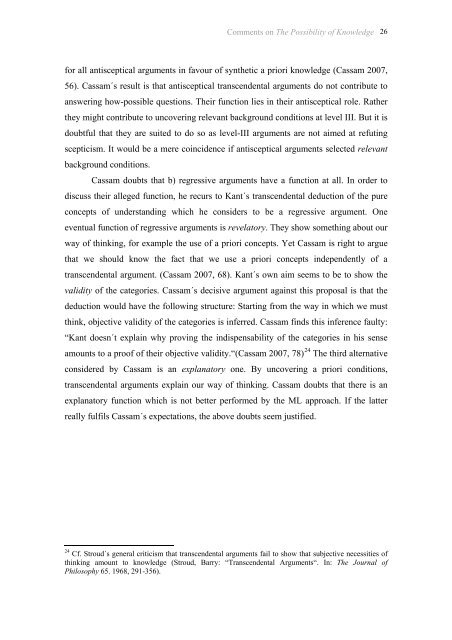Complete Issue in PDF - Abstracta
Complete Issue in PDF - Abstracta
Complete Issue in PDF - Abstracta
You also want an ePaper? Increase the reach of your titles
YUMPU automatically turns print PDFs into web optimized ePapers that Google loves.
Comments on The Possibility of Knowledge<br />
for all antisceptical arguments <strong>in</strong> favour of synthetic a priori knowledge (Cassam 2007,<br />
56). Cassam´s result is that antisceptical transcendental arguments do not contribute to<br />
answer<strong>in</strong>g how-possible questions. Their function lies <strong>in</strong> their antisceptical role. Rather<br />
they might contribute to uncover<strong>in</strong>g relevant background conditions at level III. But it is<br />
doubtful that they are suited to do so as level-III arguments are not aimed at refut<strong>in</strong>g<br />
scepticism. It would be a mere co<strong>in</strong>cidence if antisceptical arguments selected relevant<br />
background conditions.<br />
Cassam doubts that b) regressive arguments have a function at all. In order to<br />
discuss their alleged function, he recurs to Kant´s transcendental deduction of the pure<br />
concepts of understand<strong>in</strong>g which he considers to be a regressive argument. One<br />
eventual function of regressive arguments is revelatory. They show someth<strong>in</strong>g about our<br />
way of th<strong>in</strong>k<strong>in</strong>g, for example the use of a priori concepts. Yet Cassam is right to argue<br />
that we should know the fact that we use a priori concepts <strong>in</strong>dependently of a<br />
transcendental argument. (Cassam 2007, 68). Kant´s own aim seems to be to show the<br />
validity of the categories. Cassam´s decisive argument aga<strong>in</strong>st this proposal is that the<br />
deduction would have the follow<strong>in</strong>g structure: Start<strong>in</strong>g from the way <strong>in</strong> which we must<br />
th<strong>in</strong>k, objective validity of the categories is <strong>in</strong>ferred. Cassam f<strong>in</strong>ds this <strong>in</strong>ference faulty:<br />
“Kant doesn´t expla<strong>in</strong> why prov<strong>in</strong>g the <strong>in</strong>dispensability of the categories <strong>in</strong> his sense<br />
amounts to a proof of their objective validity.“(Cassam 2007, 78) 24 The third alternative<br />
considered by Cassam is an explanatory one. By uncover<strong>in</strong>g a priori conditions,<br />
transcendental arguments expla<strong>in</strong> our way of th<strong>in</strong>k<strong>in</strong>g. Cassam doubts that there is an<br />
explanatory function which is not better performed by the ML approach. If the latter<br />
really fulfils Cassam´s expectations, the above doubts seem justified.<br />
24 Cf. Stroud´s general criticism that transcendental arguments fail to show that subjective necessities of<br />
th<strong>in</strong>k<strong>in</strong>g amount to knowledge (Stroud, Barry: “Transcendental Arguments“. In: The Journal of<br />
Philosophy 65. 1968, 291-356).<br />
26




